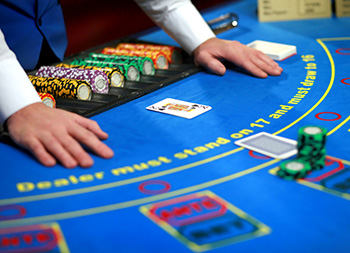News Category 
Hot Tags 
News Detail 
CASINO REVENUES MAY POST FIRST ANNUAL FALL SINCE 2002
- 2014-09-29

2014/9/29
From:Macau Daily Times
When Xi Jinping visits Macau in December to celebrate the 15th anniversary of Portugal returning its colony to China, local officials will greet the Chinese leader with huge fanfare.” However, the “warm welcome will mask concerns” about the impact that Xi’s anti-corruption campaign is having on the territory’s lifeblood: casinos.
Those were the opening remarks of last week’s Financial Times analysis report on Macau’s major industry prospects.
The FT recalls that shares in the six big casino operators have plunged 27-38 per cent this year because of the slowing Chinese economy, tighter immigration rules and measures to tackle money laundering. But experts say the biggest factor has been the anti-corruption push forcing Chinese VIP gamblers to stay at home.
“The ferocity of the anti-corruption drive has scared a lot of people,” says one top casino executive quoted by the FT.
Over the past decade, the huge numbers of Chinese punters visiting Macau have turned the territory into a gaming Mecca with seven times the revenues of Las Vegas.
The soaring growth helped the 28 sq km region of 600,000 people overtake Switzerland to become the world’s fourth richest territory per person.
Until recently the only pause in the dizzying rise was briefly in 2009 after the global financial crisis. But gaming revenues have fallen each month from June, a worrying sign for the six operators with casino licenses – Sands China, Wynn Macau, Melco Crown, SJM, Galaxy and MGM China – which are planning big expansions in the next few years in the Cotai strip.
Macau’s gaming revenues have risen by an average of 30 per cent annually over the past decade. However, the territory is in danger of seeing the first annual fall in gaming revenues since it abandoned a monopoly system in 2002. CLSA, one of the most bullish brokers on Macau, expects 2014 revenues to fall 1 per cent year on year, as casinos brace themselves for the Chinese president’s visit.
“The big dogs in Beijing are coming to Macau and some people don’t like gambling when officials are around,” says CLSA’s Aaron Fischer, who thinks Macau will face a bumpy ride for the next six months.
The anti-corruption campaign has also hit junket operators that have traditionally brought rich Chinese to Macau and provided the credit lines necessary to circumvent currency controls.
Mr Xi’s anti-graft and austerity drives have targeted everything from shark fin soup to top Communist party officials. Signs over the past year that he is aiming for Zhou Yongkang, a former member of the ruling Politburo Standing Committee, signaled that nobody was immune.
“The trickle-down effect is that some of the big players have decided that it is not going to be good to be seen playing in Macau,” says David Green, from Newpage Consulting.
Growth in the mass market has slowed because of the Chinese economy and rules that make it harder to abuse a visa-free system that allows Chinese to use Macau as a transit point.
The sting has been much worse in the VIP market, which accounts for more than two-thirds of revenues. While all casinos are being hit, “Stanley Ho’s SJM and Galaxy are most exposed with 50 per cent of the VIP market,” Mr Green told the Financial Times.
Wynn Macau relies more on VIP clients than non-Chinese competitors but Mr Green said it would suffer less than SJM and Galaxy as its gambling operations tend to be very profitable across tables.
While the casinos try to respond to the fall in VIP business – which will accelerate a greater push into mass market gambling and entertainment favored by the Macau government – signs of a slowdown have been emerging slowly.
Galaxy in June blamed a 7 per cent year-on-year fall in earnings before interest, tax, depreciation and amortization at its StarWorld Macau casino on “the worst VIP luck quarter in history”.
The casino executive says the junkets are reluctant to lend to Chinese tycoons because “you just don’t know who is next” to enter the anti-graft crosshairs, the report stated.
The London-based economic journal cited some brokers, such as Deutsche Bank, as stating that, “Macau could also face weaker mass market growth at a time when labor costs are rising”. But the casino executive quoted by the FT says China will remain a sound source of gamblers as the middle class grows. “It will be mass leading VIP after it turns round.”
Copyright@Macau Daily Times

